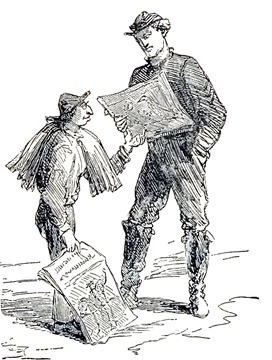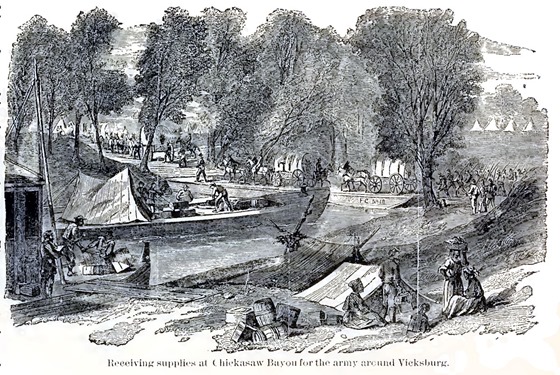JUNE 4TH.—We move at last. We left camp as the sun rose, reaching our old quarters in front of the rebel Fort Hill in the afternoon. Glad we are to get here. A great change has taken place during our ten days’ absence. More rifle-pits have been made and new batteries erected, and our lines generally have been pushed closer to the works of the enemy. Mines are being dug, and we shall soon see something flying in the air in front of us, when those mines explode. The work is being done very secretly, for it would not do to have the rebels find out our plans. Fort Hill in our front and on the Jackson road is said to be the key to Vicksburg. We have tried often to turn this key, but have as often failed. In fact, the lock is not an easy one. The underground work now going on will perhaps break the lock with an explosion. Our return to camp from our excursion after Johnston creates some excitement among those who stayed behind. They all want to hear about our trip, and what we saw and conquered. Our clothes are so dirty and ragged, that though we have sewed and patched, and patched and sewed, Uncle Sam would hardly recognize those nice blue suits he gave us a little while ago. This southern sun pours down a powerful heat, which compels us to keep as quiet as possible. Just a month from today we celebrate our Fourth of July—where, I do not know, but inside of Vicksburg, I hope.
I have asked both officers and men to write in an album I have opened since reaching our old post near the city, and here are a few of their contributions :
__________
“Friend O.: Here is hoping we may see the stars and stripes float over the court house in Vicksburg on the Fourth of July, and also that we may see this rebellion, in which so many of our comrades have fallen, come to an end, while we live on to enjoy a peace secured by our arms. Then hurrah for the Buckeye girls. Your sincere friend,
HENRY H. FULTON,
“Company E, 20th Ohio.”__________
“Here is hoping we may have the pleasure of zweiglass of lager in Vicksburg, on July 4th.
“D. M. COOPER,
“Company A, 96th Ohio.”__________
“I hope we shall be able to spend the coming Fourth in the famous city before us, and to have a glorification there over our victories.
“SQUIRE MCKEE,
“Company E, 20th Ohio.”__________
“Here is hoping that by the glorious Fourth, and by the force of our arms, we shall penetrate their boasted Gibraltar.
“T. B. LEGGETT,
“Company E, 20th Ohio.”__________
“I offer you this toast: Though you have seen many hardships, let me congratulate you on arriving safely so near Vicksburg. May the besieged city fall in time for you and all our boys to take a glass of lager on the Fourth of July; and may the boys of the Twentieth be the first to taste the article they have duly won.
“D. B. LINSTEAD,
“Company G, 20th Ohio.”





